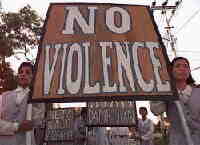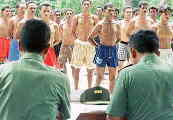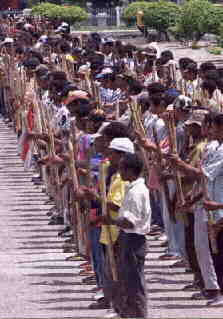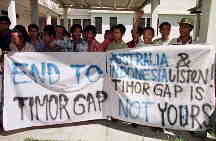Indonesia/ East Timor: the next 'hot-spot'
(in deutscher Sprache)
"NATO does not prevent violations of human rights. They supported the Turkish
torture-regime with arms-deliveries in their crimes against the population in Kurdistan. They
also provided arms to the Indonesian regime, which slaughtered tens of thousands in
East-Timor. In these and other cases, they shit on human rights."(1) That is, unless such
ostensible support fits into their plans. It seems that the particularly critical situation in East
Timor could rapidly become the "humanitarian" pretext, a lever for the situation in Indonesia,
a situation which is unacceptable for global capital.
A few weeks ago, a delegation of all German parliamentary parties visiting Indonesia warned
that East Timor was the likely next hot-spot and demanded, alongside the East Timor
solidarity movement and the representatives of the national liberation movement in East
Timor, the dispatching of an armed "international peace force."
East Timor: a long forgotten tragedy
East Timor was once a colony of Portugal, dismissed quite suddenly into independence after
Portugal's "carnation revolution" of 1974. Shortly after, a bloody civil war broke out between
the UDT and the Fretilin, two parties which had previously spoken up for independence. One
reason for this civil war, among others, was that this conflict was pre-ordained by the
maneuverings and plans of the Indonesian Government.
 In
1975 the Indonesian army marched into East Timor. In 1976, East Timor was formally
annexed a move which was never recognized by the UN. Since then, East Timor has been
listed as "territory without its own government". Portugal is regarded as its diplomatic
representative in international fora. 200, 000 people died as a result of the invasion by
Indonesia: killed, starved, or dead as a result of treatable and minor illnesses. That is, 200,000
out of, at the time, a population of approximately 800,000.
In
1975 the Indonesian army marched into East Timor. In 1976, East Timor was formally
annexed a move which was never recognized by the UN. Since then, East Timor has been
listed as "territory without its own government". Portugal is regarded as its diplomatic
representative in international fora. 200, 000 people died as a result of the invasion by
Indonesia: killed, starved, or dead as a result of treatable and minor illnesses. That is, 200,000
out of, at the time, a population of approximately 800,000.
East Timor always was a poor country. Portugal had shown no particular commitment to its
"development." For example, in 1975 there was just 20km asphalted road in East Timor.(2)
Agriculture consisted mostly of subsistence farming. During the first phase of the fight
against the Indonesian army, this fact quickly became a hunger-trap for the population.
Through the destruction of forests, the theft of livestock and the ejection of people from the
land on a huge scale, the first wave of proletarianisation was achieved within a particularly
short time. Despite many state measures (e.g. on infrastructure), East Timor however remains
largely non-industrialised. Infringements by the Indonesian army have occurred again and
again, including regular massacres. Most prominently, more than 200 people were shot during
a funeral in Dili in 1991.
The majority of the population in East Timor is Catholic. However, this has been the case
only since the annexation to Indonesia. Indonesia requires affiliation to one of the five
state-recognized religions. Many of those living in East Timor are migrants from different
parts of Indonesia. A few of them through the framework of the official transmigration
programs, most in the wake of the former or spontaneously. For some there have been distinct
benefits, in particular from the fact that land-titles had been changed, to the disadvantage of
the old-established and in favour of a by-now inflated state administration. It is unclear
exactly how many transmigrants there are. Estimates range up to 200.000(3), hence more than
20% of the population. Whereas migrants from Sulawesi and Java are Moslems, and have
their roots in a culture and history distinct from that of East Timor, migrants from West
Timor are culturally quite close to the East Timorese, many of them speaking Tetun, the
predominant indigenous language. However, they don't know Portuguese and on average
speak better Bahasa Indonesia. Between the older-established population and some migrants,
there were often bloody confrontations. In September 1995, 1,000 people fled out of East
Timor after markets and mosques were burnt.
The invasion by the Indonesian army took place one day after a meeting between Soeharto
with the-then US president, Ford(4). For the subsequent twenty years, there were many
UN-resolutions (the USA regularly abstained from voting), but in reality no state, other than
Portugal, was concerned about the fate of East Timor. In the second half of the 'nineties, this
slowly began to change, indicated most prominently with the co-awarding of the Nobel Peace
Prize to the representative of the pope in East Timor and to Jose Ramos Horta (co-founder of
the Fretilin and their representative at the UN). That this occurred in 1996 was no arbitrary
matter. There were distinct and decisive reasons for this timing. Indonesia was one of the
most prominent so-called 'Asian tigers'. In 1996 there emerged the prospect of an end to the
Soeharto era. The occupation of East Timor was deemed okay, as long as everything
remained, seemingly perhaps, in the grip of a strong military-dictatorship. Once again, it was
discovered, when it became plainly evident, that a change in the political situation in the
third-largest country in the world was inevitable. The "hot-spot" therefore, is obviously not
East Timor, but Indonesia.
Indonesia is not Yugoslavia, but there are so many parallels that a similar development seems
possible. This is substantiated by the current situation, which is getting worse not only in East
Timor, but in the whole of Indonesia. Indonesia is a multi-ethnic state, there is no ethnic
majority. Meanwhile, Indonesia is an industrialized country, the population is mostly
proletarian. It has also been the worst hit by the so-called 'Asian Crisis'. Whereas in South
Korea, initial trends of 'recovery' are noticeable, and whilst Thailand remains ledgered on a
"black zero", in Indonesia there are still no indications of improvement. The reasons are
simple. The potential for exploitation in Indonesia is immense. Today, wages in Indonesia
are perhaps the lowest in the world. However, the investment risk is enormous: Indonesian
society as a whole, and in particular the working class, refuses many of the conditions
demanded by global capital. To put it another way, the workers are cheap indeed, but not
sufficiently motivated or subordinated. Every day, there are strikes, demonstrations,
reclamations of land and other struggles, despite (or rather, because of) massively high
unemployment and poverty. Over half of the population now lives below the World Bank's
index of poverty. Moreover, in almost all parts of the country, the other side of pauperization
is evident. Acts of proletarian self-slaughtering, located and justified along the lines of
ethnicity and religion, or between old-established populations and immigrants or, in some
cases, massacres of inhabitants of neighboring villages for reasons which seem to elude
outsiders.
The social and political situation in Indonesia is explosive. Small explosions occur every
day. It is not entirely clear why the Habibie Government proposed a statute of autonomy for
East Timor in August last year. At the beginning of 1998, alongside a radicalised student
movement in Indonesia, there occurred a corresponding surge in the movement in East
Timor, most distinctly in June and July that, among other things, resulted into the flight of
tens of thousands of migrants out of East Timor. Most likely, the main reason for Habibie's
decision was his weak domestic authority, thus attempting, through the decision on the
autonomy proposal, a winning maneuver in foreign policy. It is also likely that he simply
wanted to get rid of a furnace of unrest, over and above a relatively uninteresting one (in an
economic sense). There are also liberation movements in Aceh (North Sumatra) and in Irian
Jaya (West Papua), and bloody confrontations between these and the military are once again
flaring up. Yet both regions are rich in oil (Aceh) or other mineral resources which deliver
large revenues.

 The offer of autonomy inside the Indonesian state, however, did not
lessen the independence movement in East Timor. From January 1999, there were
negotiations with the UN and Portugal, while simultaneously Pro-Indonesian militias
partly-equipped and graciously permitted through the military or military ties began to
spread fear and panics. They have attacked villages and buildings to which people have fled,
including even churches. They parade armed throughout Dili, unhindered by the police or
military. They have targeted the homes of militants of the movement for independence and
distributed leaflets announcing death-threats. Altogether, more than a hundred people have
been assassinated by these militia so far this year.
The offer of autonomy inside the Indonesian state, however, did not
lessen the independence movement in East Timor. From January 1999, there were
negotiations with the UN and Portugal, while simultaneously Pro-Indonesian militias
partly-equipped and graciously permitted through the military or military ties began to
spread fear and panics. They have attacked villages and buildings to which people have fled,
including even churches. They parade armed throughout Dili, unhindered by the police or
military. They have targeted the homes of militants of the movement for independence and
distributed leaflets announcing death-threats. Altogether, more than a hundred people have
been assassinated by these militia so far this year.
On May 5, Indonesia signed an agreement with Portugal and the UN over the statute of
autonomy and the preparation for and conduct of a ballot of the East Timorese by the UN (in
effect, a referendum to be held on August 7th or 8th) on the future of East Timor: autonomy
in Indonesia or independence. Whereas parts of the population in East Timor remain
terrorized, the leaders of the "liberation"organisations have mutated to statesmen, following
the enormous boost to their standing through the negotiations. Xanana Gusmao, head of
Falintil (the armed section of the Fretilin) and president of the CNRT (Conselho National de
Resistancia Timorese), still in jail in Jakarta, has prohibited the students in Dili from
organising demonstrations against the terror of the militias: "We thus must all contribute to
this process [the preparation of the poll] following the orientations of the UN team. To this
end, I reiterate my appeal to all to remain calm. I reiterate my appeal to the youths of Dili to
obey orders and demand that they act responsibly and with discipline."(5)
Instead of placing the future of East Timor in the hands of the "youth of Dili" he and other
'leaders' hope for a future as statesmen with a state of their own, and demands the dispatching
of an armed peace-keepers to East Timor. They don't even baulk at openly demanding an
invasion by NATO. Jose Ramos Horta, in an interview with The Gazette, a provincial
newspaper in Iowa, said: "The NATO intervention would be the first one in 50 years that can
be argued is on purely humanitarian grounds". The article continues: "Ramos-Horta said he
wished the United States or other NATO members would give his home nation of some
800,000 people the same kind of help they are giving Kosovo."(6) The Prime Minister of
Portugal, Antonio Guiterres, responded: The participation of Portugal in the NATO actions in
Bosnia and Yugoslavia give the country the "ethical authority" to demand the intervention of
the UN into East Timor.(7)
The UN will send around a few hundred, unarmed police officers, who will advise and
support the Indonesian security forces in the preparation of the referendum and the
maintenance of security. This is certainly a even perhaps a consciously gamble.
Everyone with an inclination will be capable of an attack on an unarmed group and there are
enough with an inclination -- from the pro-Indonesian militias, who want to prevent the
referendum, to sections of the military, to whom an armed confrontation with 'foreign
aggressors' would be a pretext to organizing, for example, a coup and the enforcement of
martial law in the country.
What remains unclear is the role and destiny of immigrants in East Timor. In the agreement
on the statute of autonomy, those recognised as East Timorese citizens are those who have
lived there prior to 1975 or have lived there for 5 years or longer. On the other hand, in the
agreement on the referendum only those who were born there or who have parents or
grandparents or a spouse who were born there are recognised as citizens. That is effectively
an ethnic definition, which includes the exiled Timorese, but excludes immigrants. This
might be the precondition of ethnic cleansings. Furthermore, the validity of such agreements
rest on their adoption by the Indonesian parliament which, practically speaking, could occur
only after the ballot, since the new parliament does not assemble before August (supposing
that the elections will be moderately successful, which is far from certain at the time of the
writing this article, one week before the elections). Currently, almost all parties, including
the PDI Perjuangan headed by Megawati, are still against the independence of East Timor.
 Finally, we can perhaps find the biggest occasion for war in an agreement between
Australia and Indonesia over the exploitation of a newly-discovered and huge oil field
between East Timor and Australia. This treaty between Indonesia and Australia was signed
under the protest of Portugal. Australia only recently built up a rapid task force stationed in
Darwin, the closest point in Australia to East Timor.
Finally, we can perhaps find the biggest occasion for war in an agreement between
Australia and Indonesia over the exploitation of a newly-discovered and huge oil field
between East Timor and Australia. This treaty between Indonesia and Australia was signed
under the protest of Portugal. Australia only recently built up a rapid task force stationed in
Darwin, the closest point in Australia to East Timor.
Down with the humanitarian war-mongers!
Formerly wars were 'just wars', nowadays they are 'for humanity'. This means that any
occasion can become the pretext. The situation in Indonesia delivers these justifications en
masse. Furthermore, the radical state-humanists no longer hesitate. From the Indonesia/
East Timor solidarity movement to the rebel-leaders now chastened into statesmen, right
through to the German PDS (left-wing party; formerly SED), they all demand war now.
There are no exceptions left. Everybody now demands "armed peace-keepers", from the
USA, from the German Federal Government or from whomever else demands the preparation
and conducting of a war in Indonesia, which will be led together with the reactionary powers
in Indonesia against the working class. Whether global capital and its armed troops submit to
this requirement is still today certainly speculation. But if the Balkan crisis can be solved with
bombs, why not the Asian crisis?
Karl Eugen, May 31, 1999 (from:Wildcat Zirkular, n. 50)
Home, Index Asia, Daily Asia News
A webpage of WELT IN UMWÄLZUNG (World in Transformation)
Mannheim-Ludwigshafen, Germany
Juli 26, 1999
1. Leaflet of FAU Cologne, according to: kumm erus, No 10 (a lot of similar arguments were delivered by leftists
during the war in Yougoslavia!)
2. Craig Johnson, East Timor: Environmental Degradation linked to Human Rights Violations, the Ability of NGOs
to affect Policy and a causal Explanation for the Lack of Action, 1996
3. Dr George J. Aditjondro, Migrants, Freedom Fighters, and Military Instigators: A Case Study on Migrants and
Resitance in East Timor, 1996
4. Johnson, a.a.o.
5. CNRT Statement May 10, 1999
6. The Gazette, Cedar Rapids, Iowa, April 9, 1999
7. LUSA, Portuguese News Agency, April 9, 1999
 In
1975 the Indonesian army marched into East Timor. In 1976, East Timor was formally
annexed a move which was never recognized by the UN. Since then, East Timor has been
listed as "territory without its own government". Portugal is regarded as its diplomatic
representative in international fora. 200, 000 people died as a result of the invasion by
Indonesia: killed, starved, or dead as a result of treatable and minor illnesses. That is, 200,000
out of, at the time, a population of approximately 800,000.
In
1975 the Indonesian army marched into East Timor. In 1976, East Timor was formally
annexed a move which was never recognized by the UN. Since then, East Timor has been
listed as "territory without its own government". Portugal is regarded as its diplomatic
representative in international fora. 200, 000 people died as a result of the invasion by
Indonesia: killed, starved, or dead as a result of treatable and minor illnesses. That is, 200,000
out of, at the time, a population of approximately 800,000.

 The offer of autonomy inside the Indonesian state, however, did not
lessen the independence movement in East Timor. From January 1999, there were
negotiations with the UN and Portugal, while simultaneously Pro-Indonesian militias
partly-equipped and graciously permitted through the military or military ties began to
spread fear and panics. They have attacked villages and buildings to which people have fled,
including even churches. They parade armed throughout Dili, unhindered by the police or
military. They have targeted the homes of militants of the movement for independence and
distributed leaflets announcing death-threats. Altogether, more than a hundred people have
been assassinated by these militia so far this year.
The offer of autonomy inside the Indonesian state, however, did not
lessen the independence movement in East Timor. From January 1999, there were
negotiations with the UN and Portugal, while simultaneously Pro-Indonesian militias
partly-equipped and graciously permitted through the military or military ties began to
spread fear and panics. They have attacked villages and buildings to which people have fled,
including even churches. They parade armed throughout Dili, unhindered by the police or
military. They have targeted the homes of militants of the movement for independence and
distributed leaflets announcing death-threats. Altogether, more than a hundred people have
been assassinated by these militia so far this year.
 Finally, we can perhaps find the biggest occasion for war in an agreement between
Australia and Indonesia over the exploitation of a newly-discovered and huge oil field
between East Timor and Australia. This treaty between Indonesia and Australia was signed
under the protest of Portugal. Australia only recently built up a rapid task force stationed in
Darwin, the closest point in Australia to East Timor.
Finally, we can perhaps find the biggest occasion for war in an agreement between
Australia and Indonesia over the exploitation of a newly-discovered and huge oil field
between East Timor and Australia. This treaty between Indonesia and Australia was signed
under the protest of Portugal. Australia only recently built up a rapid task force stationed in
Darwin, the closest point in Australia to East Timor.